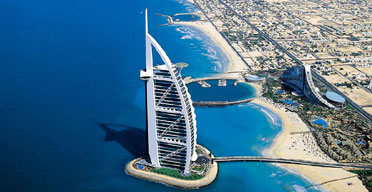DUBAI, Dec 4 – Dubai remains a regional hub for finance and tourism but must build up those sectors to replace the construction industry, as the emirate’s economic growth grinds to a halt amid the global economic crisis, analysts have said.
Fears have mushroomed about the viability of the Gulf city state’s economy after revelations that its main state-run company, Dubai World, is struggling to meet debt repayment deadlines, spurring panic over a possible financial collapse.
"Of course, this is not the bankruptcy of Dubai," said Marwan Barakat, chief economist at Lebanon’s Bank Audi.
"There is no other city in the region that has the same assets," he told AFP, referring to Dubai’s infrastructure and to its success in becoming a regional centre for finance and tourism.
Jim Krane, the author of a book on Dubai entitled "City of Gold", also dismissed claims that Dubai is collapsing.
"I do not think it is the end. Dubai is still the main financial services centre for the region," he said. "Half of Dubai’s economy, including business, tourism, shipping, trade, and logistics is still viable."
During several years of rapid growth, fuelled by a regional windfall of oil revenues and an abundance of foreign cash inflows, Dubai developed a flourishing tourism sector, with top-class hotels, grandiose malls and luxury beach and desert resorts.
The emirate hosted 7.5 million tourists in 2008, up 8.3 percent from 2007.
Dubai has also built the Dubai International Financial Centre (DIFC) as an onshore capital market allowing 100 percent foreign ownership of companies. It hosts many international banks and finance houses.
It boasts two ports that together were ranked the seventh top container port worldwide in 2007. Next to Jebel Ali port – the largest in the Middle East – sits the Jebel Ali Free Zone Area, home to 6,000 businesses from over 110 countries, according to the JAFZA’s website.
Dubai’s airport has developed in few years into a major transit hub linking Europe with Asia and Australia, becoming the region’s busiest airport, which handled over 34 million passengers in 2008.
Dubai has invested heavily in its roads and transport, creating a local roads network that is unmatched in the region. It recently boosted its public transport with a metro railway line — the first in the Gulf Arab countries.
But the global financial crisis and the Dubai World debt woes, have turned the tap tightly closed on international finance that had fed Dubai’s aggressive economic expansion.
Analysts say Dubai, and state-owned businesses with estimated debts of up to 100 billion dollars, must focus on protecting the comparative advantages that it has built over the years.
"Over the longer term, a key challenge for Dubai will be the preservation of its status as the leading regional hub for trade, tourism and finance," said Tristan Coopers from Moody’s Global Credit Research.
"Currently, Dubai’s infrastructure is superior to that of the competing states in the region," he said
"But if capital markets access for Dubai remain more restricted and more expensive than for its neighbours, it is likely that the infrastructure gap between Dubai and competing regional states with larger hydrocarbon resources will gradually close," he added.
Krane said the economy should diversify away from construction.
"New Dubai should have less labour intensive industries, move into business knowledge, media, technology, biotechnology," he said.
Barakat said that Dubai should have "a further deepening of the economy away from the property sector and towards high value added export oriented sectors."



































